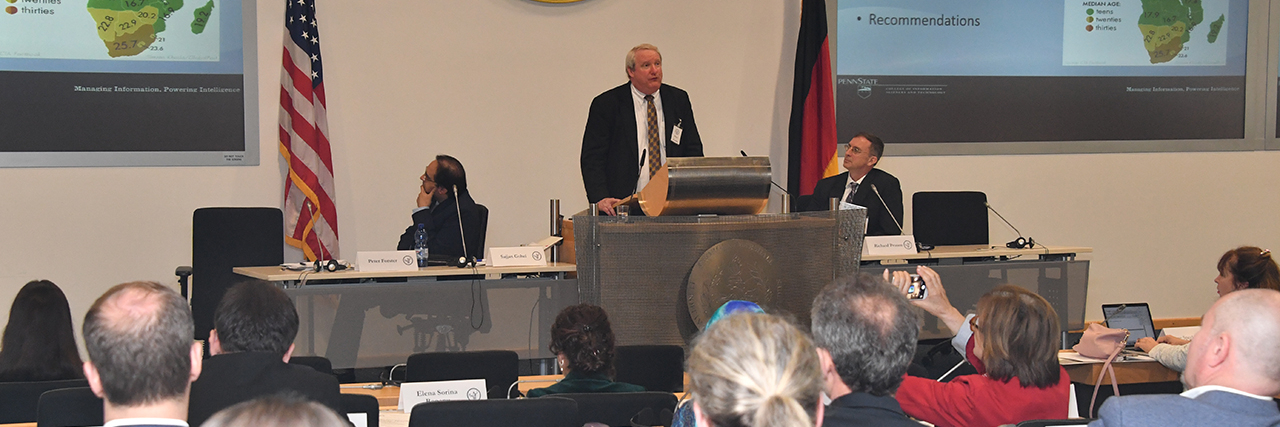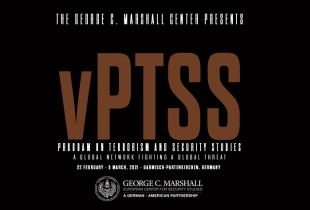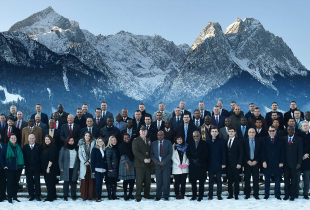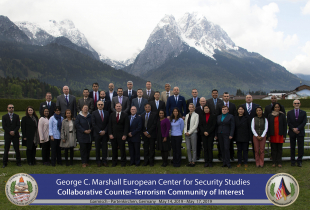
Marshall Center, Partnership for Peace Consortium’s Combating Terrorism Working Group Leads Seminar on Foreign Terrorist Fighter Networks
By Christine June
Public Affairs Office
George C. Marshall European Center for Security Studies
GARMISCH-PARTENKIRCHEN, Germany (June 2, 2017) – The George C. Marshall European Center for Security Studies co-hosted The Partnership for Peace Consortium’s (PfPC) Combating Terrorism Working Group (CTWG) a leading-edge seminar entitled “Foreign Terrorist Fighter Networks: Threats, Challenges, and Responses” May 30 and 31.
The two-day workshop brought together 50 international counterterrorism practitioners and specialists from 17 nations, working in different agencies, to explore emerging threats, identify vulnerabilities, and devise practical responses through an interactive table-top exercise (TTX) based on current trends and ground truth.
Key takeaways from the event will be compiled into actionable policy recommendations for senior leaders on current challenges and threats facing NATO Allies and Partners.
“The PfPC Combating Terrorism Working Group is a very unique organization because it brings together practitioners and academics to look at real world problems in the terrorism space and to come up with policy recommendations that then can go forward to U.S. Department of Defense, NATO and Organization for Security and Cooperation in Europe (OSCE),” said Dr. Peter Forster, associate dean, College of Information Sciences and Technology, Penn State University and PfPC-CTWG co-chair.
He added that this working group meets twice a year, once at the Marshall Center and then again at a partner country.
The seminar examined the complex and dynamic threat of a dispersing terrorist network, as ISIS’ footprint in Iraq and Syria and foreign terrorist fighters are squeezed out of the caliphate or Islamic state.
The seminar assessed new vulnerabilities and challenges facing national security decision makers by considering digital recruitment, fundraising and mobilizing campaigns, the creation of virtual cells linked via cyberspace, and the re-emergence of Al Qaeda.
Innovative counterterrorism and counter violent-extremism strategies were discussed detail, including linking terrorism and crime-related databases, enhancing public-private cooperation with internet providers, engaging psychologists, and liaising with local community leaders.
Central to the seminar was a table-top exercise featuring a whole-of-society approach aimed at sharing best practices in response to foreign terrorist fighter activity.
“I think there’s no time to be complacent about these things, and I think it’s important that we bring all sides and all points of view to the table because we might be able to find some good solutions,” said Faran Tahir, a renowned Pakistani-American actor also active in counter-violent extremism, on why he wanted to be a part of this exercise.
The interactive table-top exercise is based on the Global Counterterrorism Forums’ Hague-Marrakech Memorandum foreign terrorist fighter recommendations, and utilizes a case study methodology to help participants devise effective strategies, formulate policy recommendations, and develop programmatic responses for public and private sector leadership.
Exercise participants discussed comprehensive solutions to address the evolving dynamics of foreign terrorist fighter networks – incorporating preventative, criminal, administrative, and rehabilitative efforts and measures.
The objectives of the table-top exercise were: building awareness of foreign terrorist fighter-related challenges among counterterrorism professionals; developing analytically rigorous policy responses; sharing best practices; and, identifying further areas for international collaboration.
Other seminar participants included: Richard Prosen, a foreign affairs officer with the U.S. Department of State and PfPC-CTWG co-chair; Dr. Magnus Ranstorp, research director at the Center for Asymmetric Threat Studies (CATS); Dr. Sajjan M. Gohel, International Security director of the London-based Asia-Pacific Foundation; PfPC-CTWG Senior Advisor;; U.S. Army Lt. Col. Brian Steed, assistant professor of Military History at the U.S. Army Command and General Staff College; Dr. Anne Speckhard, director of the International Center for the Study of Violent Extremism; Michael Scardaville, principal director for Information Sharing Policy at U.S. Department of Homeland Security; Imam Awes Mohamed Abdullah, Islamic religious leader based in London; and, C. Holland Taylor, co-founder, chairman and CEO of LibForAll Foundation.
The CTWG, one of the PfPC’s nine working groups, is a multinational think tank of internationally recognized terrorism studies specialists organized to better understand international, regional, and domestic terrorist and violent extremist threats, in order to educate and train future military, civilian and other leaders engaged in counterterrorism, and to provide policy analysis and related assistance to decision-makers.
The PfPC operations staff is co-located with the George C. Marshall European Center for Security Studies in Garmisch-Partenkirchen, Germany. Marshall Center’s Director U.S. Army Lt. Gen. (Ret.) Keith Dayton is the chairman for PfPC’s Senior Advisory Council, which governs PfPC and meets annually to guide PfPC’s strategic direction.


